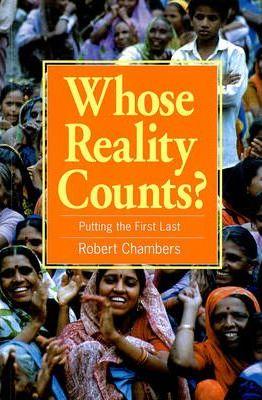Whose Reality Counts?: Putting the First Last

Whose Reality Counts?: Putting the First Last
In this sequel to Rural Development: Putting the last first Robert Chambers argues that central issues in development have been overlooked, and that many past errors have flowed from domination by those with power. Development professionals now need new approaches and methods for interacting, learning and knowing. Through analysing experience - of past mistakes and myths, and of the continuing methodological revolution of PRA (participatory rural appraisal) - the author points towards solutions. In many countries, urban and rural people alike have shown an astonishing ability to express and analyse their local, complex and diverse realities which are often at odds with the top-down realities imposed by professionals. The author argues that personal, professional and institutional change is essential if the realities of the poor are to receive greater recognition. Self-critical awareness and changes in concepts, values, methods and behaviour must be developed to explore the new high ground of participation and empowerment. Whose Reality Counts? presents a radical challenge to all concerned with development, whether practitioners, researchers or policy-makers, in all organizations and disciplines, and at all levels from fieldworkers to the heads of agencies. With its thrust of putting the first last it presents a new, exciting and above all practical agenda for future development which cannot be ignored. BAI Catalogue: The methods and approaches of Participatory Rural Appraisal (PRA) comprise the core of this book. But PRA has evolved and spread in many directions and into many areas. The author argues that PRA has come to affect much development practice, professionalism, research, education, training, management and many institutions. The PRA experience has led into wider questions about development and about the human condition. It has pointed towards a gap in the writing about development - the lack of analysis of how error, professionalism, power and personal interaction interlink - a gap which the author tries to fill with this book. The argument runs that reflective and self-critical PRA practitioners are evolving a philosophy and behaviour which seem to promise better performance. This new approach combined with other trends are part of a deep shift in ways of thinking, seeing, acting and being in the world. So the book is about more than PRA and more than just development. The author contends that, as a term, participatory rural appraisal no lon
PRP: 252.81 Lei
Acesta este Prețul Recomandat de Producător. Prețul de vânzare al produsului este afișat mai jos.
227.53Lei
227.53Lei
252.81 LeiLivrare in 2-4 saptamani
Descrierea produsului
In this sequel to Rural Development: Putting the last first Robert Chambers argues that central issues in development have been overlooked, and that many past errors have flowed from domination by those with power. Development professionals now need new approaches and methods for interacting, learning and knowing. Through analysing experience - of past mistakes and myths, and of the continuing methodological revolution of PRA (participatory rural appraisal) - the author points towards solutions. In many countries, urban and rural people alike have shown an astonishing ability to express and analyse their local, complex and diverse realities which are often at odds with the top-down realities imposed by professionals. The author argues that personal, professional and institutional change is essential if the realities of the poor are to receive greater recognition. Self-critical awareness and changes in concepts, values, methods and behaviour must be developed to explore the new high ground of participation and empowerment. Whose Reality Counts? presents a radical challenge to all concerned with development, whether practitioners, researchers or policy-makers, in all organizations and disciplines, and at all levels from fieldworkers to the heads of agencies. With its thrust of putting the first last it presents a new, exciting and above all practical agenda for future development which cannot be ignored. BAI Catalogue: The methods and approaches of Participatory Rural Appraisal (PRA) comprise the core of this book. But PRA has evolved and spread in many directions and into many areas. The author argues that PRA has come to affect much development practice, professionalism, research, education, training, management and many institutions. The PRA experience has led into wider questions about development and about the human condition. It has pointed towards a gap in the writing about development - the lack of analysis of how error, professionalism, power and personal interaction interlink - a gap which the author tries to fill with this book. The argument runs that reflective and self-critical PRA practitioners are evolving a philosophy and behaviour which seem to promise better performance. This new approach combined with other trends are part of a deep shift in ways of thinking, seeing, acting and being in the world. So the book is about more than PRA and more than just development. The author contends that, as a term, participatory rural appraisal no lon
Detaliile produsului










